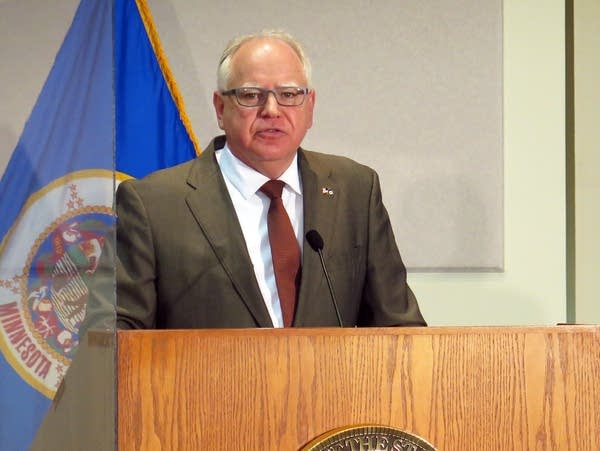Crunch time at MN Capitol collides with COVID fight

Go Deeper.
Create an account or log in to save stories.
Like this?
Thanks for liking this story! We have added it to a list of your favorite stories.
Gov. Tim Walz is set to outline coronavirus next steps this week with an announcement that also could have a big bearing on the way he and the Legislature wrap up their budget work.
The typical Capitol crunch time and the ongoing COVID-19 fight are intimately linked, with key Republicans saying the session’s remaining work can’t be separated from the special authority Walz has exercised during the pandemic.
Sometime this week, Walz is due to announce the latest easing of restrictions that have been in place for many months.
While schools are open and youth sports rebooted long ago, some activity restrictions around businesses are still in effect. Most are able to operate at some level, with crowd size and capacity limits or restrictions on hours in various sectors.
Turn Up Your Support
MPR News helps you turn down the noise and build shared understanding. Turn up your support for this public resource and keep trusted journalism accessible to all.
“There’s probably only a couple turns left,” Walz said Friday of his metaphorical dial used to calibrate the mitigation efforts. His prediction that the State Fair in late August would be “a pretty close to normal event” was a tell that he’s inclined to roll back the lingering limits well before then.
Many states have begun setting dates for full-scale economic openings. Something similar is expected from Walz. The questions are how aggressive that timetable is and how much his glide path will be tied to virus and vaccination levels.
When Walz does unveil his plan, he will no doubt be pushed to speak to one of the most enduring symbols of the pandemic: masks. He has long said his mask-use mandate in public spaces and places of commerce would be among the last to go.
The COVID-19 restrictions are rooted in the Walz emergency powers that he’s exercised since March of last year. His next monthly renewal isn’t up for consideration until May 14.
But Republicans say they want the governor to rescind the emergency or at least give a date when he will.
House Minority Leader Kurt Daudt, R-Crown, grabbed at the Walz comment about the State Fair Friday as a sign the crisis has passed.
“If the State Fair is on, the emergency is over, and the emergency powers need to end,” Daudt tweeted.
Last week, Senate Majority Leader Paul Gazelka also issued a warning. The East Gull Lake Republican said continuation of the powers and a move by the governor to control the destination of $2.6 billion in federal aid would sink a budget deal. And he said it would lead the Senate to consider passing what’s called a “lights-on” budget that could put agencies in a financial squeeze and forgo new programs.
“If the governor does not want to work with us regarding giving up the emergency powers now and spending the federal stimulus money together, then that would be the direction we go,” Gazelka said. “A very, very simple budget to make sure our government continues to run and keep Minnesota open.”
Walz has said some type of continuation of executive powers is needed to ensure special federal aid around nutrition programs continues and that vaccination and testing sites can be managed nimbly.
Reaching accord on a new two-year state budget won’t be easy either. Hundreds of millions of dollars and countless policy differences are scattered across more than a dozen bills.
Legislative leaders, key committee chairs and administration officials have already begun their closed-door talks to work through the high-level disputes.
Because of the pandemic, there won’t be the usual hunkering down in private and there might be fewer press conferences where top officials trade barbs and limited details about their discussions.
This stage, which usually drags on for days or even weeks, could be under greater time pressure.
House Speaker Melissa Hortman, DFL-Brooklyn Park, is firm that the overarching deal be struck by Friday. Without that the topic-by-topic bills can’t be buttoned up. The office that actually writes bills is operating at reduced capacity so it needs a bit more time than normal.
There are many moving parts.
One is the debate over an eviction moratorium off-ramp. It will determine how soon the eviction protections would go away and under what circumstances. There are significant but not impossible differences to work out there.
Another surrounds policing.
Starting Monday morning, a public safety conference committee will start examining what adjustments to police tactics and transparency could happen this session.
The House is pursuing a lengthy law enforcement change agenda while the Senate has indicated it would do far less — if anything beyond the regulations adopted last year.
That will be a key pressure point because Walz and Democratic lawmakers have made significant police accountability a must-have of the session.
“There is an urgency,” said Sen. Bobby Joe Champion, DFL-Minneapolis. “And we all must work together to heed the call and grasp the moment.”


